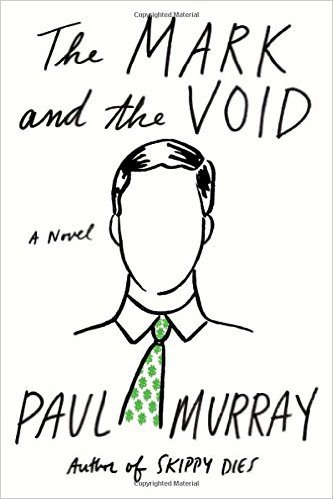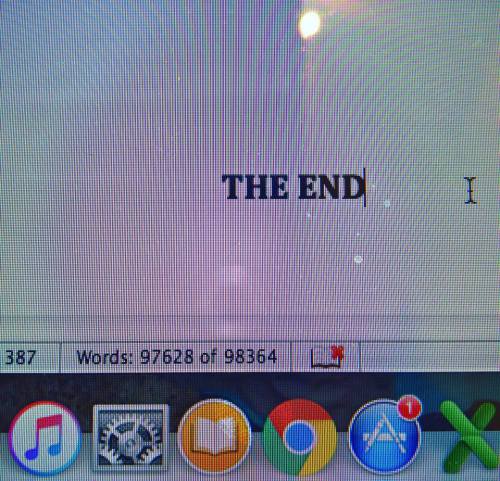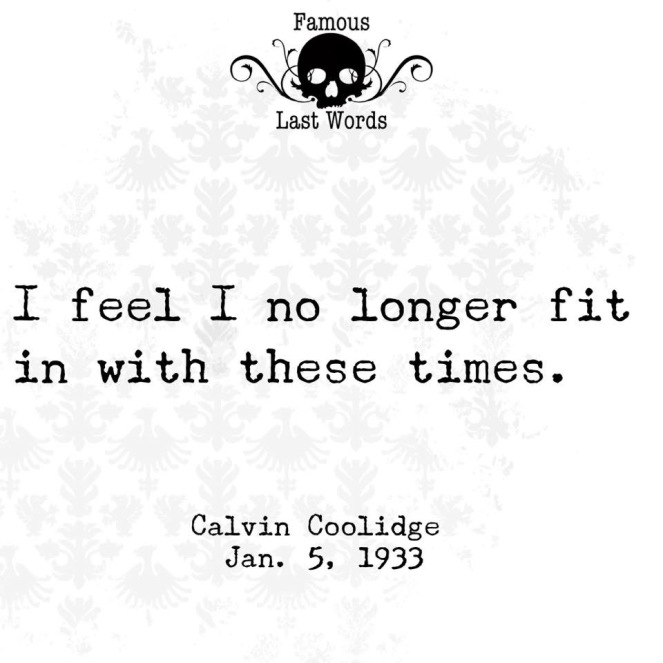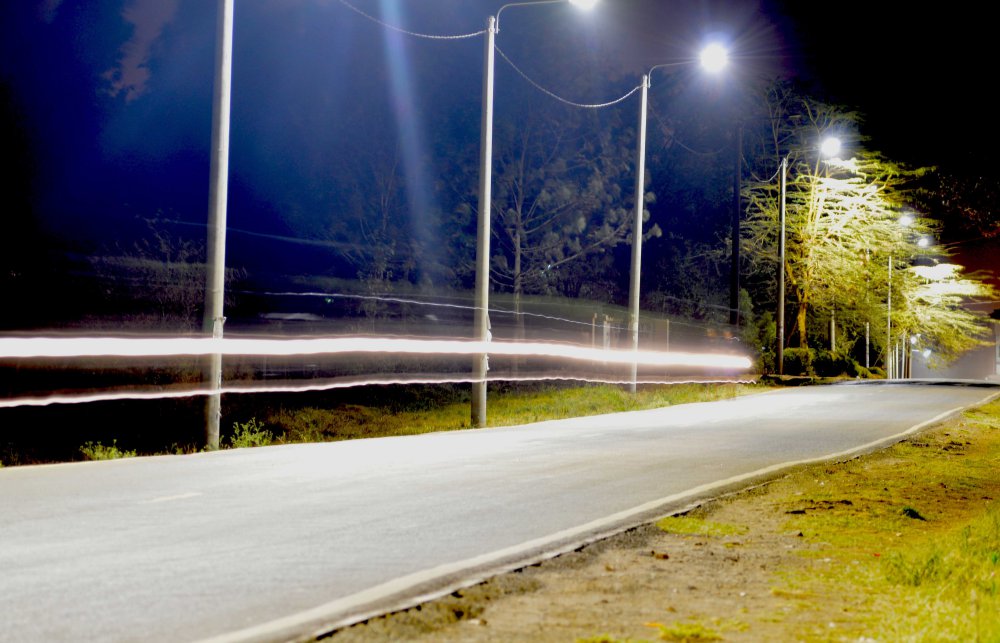The Mark and the Void was one of my favorite novels of 2015. I wrote a review of it for Full Stop, but, for whatever reason, never posted that review here. Now I’m posting it. The full review is below.

Paul has an idea for a novel. A banker decides to rob the bank he works for. Only it’s an investment bank, and investment banks have no cash, no safes to crack, nothing but numbers on computer screens, changing totals from one account to another. It’s all so ephemeral. He can’t stuff it in a sack and head for the border. On top of this, the banker is being observed by a mysterious stranger. The banker feels the stranger before he sees him, but pretty soon the stranger becomes more than a creepy feeling. He becomes a presence, now approaching the banker with an idea.
So begins Paul Murray’s latest novel The Mark and the Void. The story follows Claude, a French banker working in the financial district of Dublin. He is approached by a writer named Paul who claims to be working on a novel about the banking industry after the global economic collapse of 2008. He wants Claude to be his muse and his everyman character. Claude grants him access into the world of international banking. Claude’s coworkers are energized by Paul’s presence. They fantasize about their roles in Paul’s novel and feed personal narcissisms about being the subject of literature, all the while ignoring the facts that they don’t read novels, that Paul’s last book was a commercial and critical failure, and that Paul seems a whole lot more like a conman than any kind of writer.
And, as Paul’s prefatory idea for a novel suggests, the idea of robbing the investment bank emerges.
At the end of the preface, Paul the character (as opposed to Paul Murray, the author) asks the reader, “What do you think? Would people buy it?” This forces the reader, not yet four pages in, to decide whether or not she could accept the possibility of Claude as a literary protagonist and accept the possibility that Paul is running a con on us all. These are not insignificant questions. There’s a reason why we have very few investment bankers in literature. They’re boring. Even when great writers shape protagonists out of everymen with mundane jobs — think of Joseph Heller’s middle manager in Something Happened — the results are middling at best. When lesser writers, like Bret Easton Ellis in American Psycho, make an investment banker the protagonist, the banker has to be a serial killer to be even remotely interesting. But Paul isn’t promising to be a great writer like Joseph Heller, and he’s not offering gore and mayhem like Ellis. He’s instead giving you an impossible proposition: an investment banker robs his own bank, which has no actual money, rather than robbing the taxpayers and his investors, which is who investment bankers typically rob. In other words, Paul is telling you that you’re being conned. It’s up to you to decide whether or not to go along with it for another 450 pages.
Unlike Paul the character, Murray the author gives us good reason to go along with the con. His previous novel, Skippy Dies, is brilliant. It was short listed for the Costa and National Book Critics Circle Awards and longlisted for the Booker. It may well have set a record for the novel nominated for the most awards without actually winning one. Beyond the accolades and near misses, Skippy Dies is a stunning mixture of comedy and tragedy. It hints at a depth that Murray can mine for a few more books. Specifically, the elite Catholic boarding academy at the center of Skippy Dies has been taken over by a business teacher who seeks to exchange the religious focus of the academy for an ideology of the marketplace. Rather than producing graduates who embrace a Catholic morality, the children of Dublin’s economically elite families learn to view the private school as a pipeline into the financial industry. In this sense, neoliberalism replaces Catholicism as Ireland’s most influential religion.
From the start, The Mark and the Void promises to explore this theme with more depth. Murray introduces the notion that the marketplace is becoming the true religion of Ireland early in the novel. He describes the financial district of Dublin “as a private fiefdom, like Vatican City in Rome, only devoted to money instead of God.” And the financial industry of the novel operates like the medieval Catholic Church. Everyone tithes to it, whether they believe in it or not. It hoards the vast majority of the region’s wealth and turns that wealth into power. It holds sovereignty over the lives of the populous, dictating how society’s resources will be allocated, who will win and who will lose. It sometimes awards the most devout with small tokens of its overall hoard, but mostly keeps the earthly rewards to itself. And, like religion itself, the financial industry is based largely on faith. The only real value the paper in your wallet — or, more likely, the numbers on your computer screen when you check your bank account — has is symbolic. We have faith that these numbers mean something in exchange for real goods like food and clothing and transportation and housing. As long as we all agree to believe in that symbolic power, it does have value. And, like so many organized religions, those closest to the symbolic power tend to be the most corrupt.
Murray examines the intricacies of this neoliberal religion through Claude. Claude meditates on his role as a banker, and his willingness to sacrifice things like love, family, travel, and community — his “whole life,” as he puts it — for the job. He says that “every banker has in his head a number, or rather a Number. This Number represents the amount of accumulated wealth he has decided will be enough.” The second he reaches this number, he’ll get out of banking. But, as Claude observes, “the bigger problem is that as you approach it, the Number tends to change. It shifts upward.” In this sense, Claude’s Number fulfills the role of heaven for the neoliberal: it’s the reward for lifelong piety. Money is invested with a redemptive value. His whole life is worth trading for a certain amount of it. Forget even the symbolic power of money to buy real goods. He has gone beyond the need for anything real. His necessities are taken care of. Even his luxuries are attainable and attained. There’s nothing the money can buy him now. Further, Claude, unlike his higher ups in the financial industry, isn’t in a position to make enough money to buy real power. Nor does he seek the power that the global one percent have to bribe politicians to reshape public policy in their image. He instead seeks that spiritual place where a Number symbolically redeems all his sacrifices.
Claude wants to articulate this for Paul, but he says, “I don’t feel confident that I could explain this without making it seem like more greed.” Because, on the surface, it is greed. Members of the financial industry suffer from a similar emotional disorder as the people on Hoarders, only the financial industry’s hoards are neatly tucked away behind so many secured internet spaces instead of visibly represented in old pizza boxes and dirty diapers. For Claude, though, it’s more than greed; “it’s something more mysterious.” Because the Number only makes sense in a religious context: as the realm of spiritual redemption or as an absolution for his sins against humanity. Likewise, neoliberalism — the ideology that privileges the concerns of the marketplace over all other concerns—only makes sense as a religion. It demands that we put all our faith and social safety nets into the Invisible Hand of the Marketplace, trusting it to make everything all right, to bring about paradise and equality despite the fact that this trust in the past has led mostly to world wars and profound inequality.
Claude takes a typical path to the church of neoliberalism. He comes from a small village in France. His father was a blacksmith and a veteran of the 1968 revolution. He simultaneously pushed Claude into banking and resented Claude as he became a banker. Claude, for his part, honors his father’s revolutionary past by studying philosophy in college. He focuses on the works of François Texier, a fictional amalgamation of Jean Baudrillard and Guy DeBord. Texier has his own theory of neoliberal religion. He observes that, at its inception during the Middle Ages, “the corporation was almost identical to contemporary ideas of angels . . . immaterial, ageless, capable of acting like human beings but bound by neither substance nor time; the corporation, an entity which we imagine as a uniquely secular creation, a paragon of reason and common sense, in fact began its life as an offshoot of a Christian myth.” Texier goes on to argue, “Today, though we no longer believe in angels, we still regard the corporation as a higher order of being.”
French philosophy of the ’68 revolution doesn’t bond Claude with his father. Claude has great difficulty embracing relationships with anyone. Love, family, and community are all too much for him. He escapes from them all through the world of banking. In a moment of clarity, he says, “Perhaps after all that is the true purpose of Business: to replace the shifting, medieval labyrinths of love with the broad, sanitized avenues of materialism, the lightless, involuted city of the self with something gridlike and rational.” Claude goes all in, living a monk-like life inside a cubicle and a condominium, purified in the glow of his numbers on a screen.
It’s no wonder that Claude and his coworkers are so open to Paul, even if Paul seems like a conman. The bankers’ world is devoid of art, devoid of any questions of meaning that go deeper than materialism. Even as a largely failed novelist, Paul introduces them to subjunctive worlds, spaces where they can imagine alternatives to the dominant neoliberal narrative. The only problem: contemporary Ireland — and contemporary global society, by extension — has no room for a novelist among the clutter of a wireless world. Paul has love. He married a stripper. He has family, including his mostly neglected four-year-old son, Remington Steele. He is part of a community, albeit a community of hustlers and conmen. He’s been ensnared by the trappings of the global boom, and now he’s struggling to untangle himself during the bust. Unlike the banking system that Claude works for, no government funds exist to bail out Paul. As much as the bankers need Paul and his art, Paul needs money to keep his home and feed his son and keep his wife off the stripper pole.
This establishes the dramatic tension of the novel. The neoliberal religion is failing to provide any meaning deeper than materialism. The banker turns to the novelist to help him examine the depth of love and life, but the novelist has been reduced to a desperate state. His time is spent clawing for a handhold on a slick and rocky cliff. If Claude is going to get his whole life back from the sacrifices he’s made to banking, he needs to recuperate the damage his financial sector has waged on artists like Paul. Or just on Paul himself.
In line with Skippy Dies, these powerful themes are carried through the novel on the shoulders of humor. The Mark and the Void is funny on so many levels. There’s direct political satire, like the Forbes article on Claude’s boss, Porter Blankly, which relies on glowing hyperboles to portray Blankly as a slightly more sociopathic Kenneth Lay. There’s corporate satire, like when Blankly coins the term “Think Counterintuitive,” a thinly veiled allusion to Steve Jobs’s “Think Different.” Beyond both slogans needing the “ly” to make them grammatically correct, there’s all the employees at Claude’s investment bank who make ridiculous and dangerous mistakes in their attempts to think counterintuitively. There’s Paul’s con, which would be obviously bad if his marks weren’t so illiterate. At one point, Claude wants to know more about Paul. Paul counters that the protagonist never knows much about his author. After all, Paul says, “Do you think Billy Budd knew where Conrad lived?” The fact that Paul’s attribution of Billy Budd to Joseph Conrad doesn’t set off any red flags makes it even funnier. Later, Paul tells Claude that Winston Churchill (born 1874) wrote parts of War and Peace (1869). Claude is fascinated to learn this.
Other sections of the novel are slapstick. There’s a lot of language play. There’s a bit of bathroom humor to keep things from getting too serious. There are touches of romantic comedy. And, as the plot careens toward its climax, there’s a lot of good, old-fashioned absurdity.
Murray also recognizes that every story needs love. At one point, the bankers debate whether or not a great novel has ever failed to deliver on a love story. Claude offers 20,000 Leagues Under the Sea. His colleague, Ish, retorts, “Every story needs love. Even at the bottom of the sea.” So there are love stories. Claude falls for a Greek waitress named Ariadne. Paul struggles in his relationship with his wife. Ish tries to write herself into a romantic narrative. And, perhaps most significantly, there is the homosocial love affair between Paul and Claude.
In the end, Murray pulls off the impossible. He writes a funny, poignant, human, and philosophical novel about an investment banker. It raises deep questions. It makes shallow jokes. It argues for the need of arts and philosophy in the face of global consumer capitalism. It unpacks ideologies that are so prevalent they seem natural. Throughout the reading, it feels like we’re being conned, not so much by Paul Murray as by the world outside the novel. Still, for all the weight the novel carries, Murray takes care to make the experience of reading the book a whole lot of fun.
Share this:





